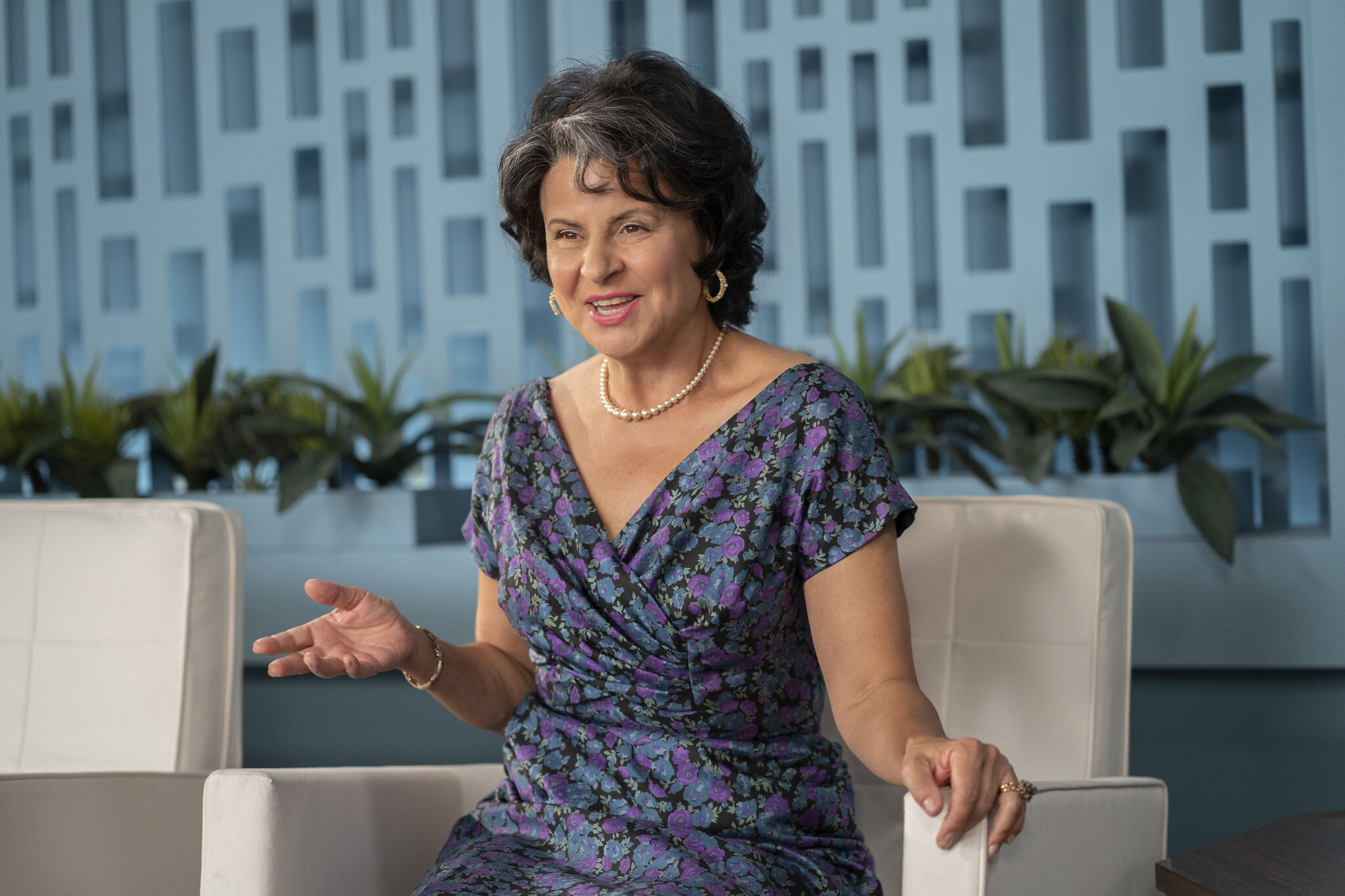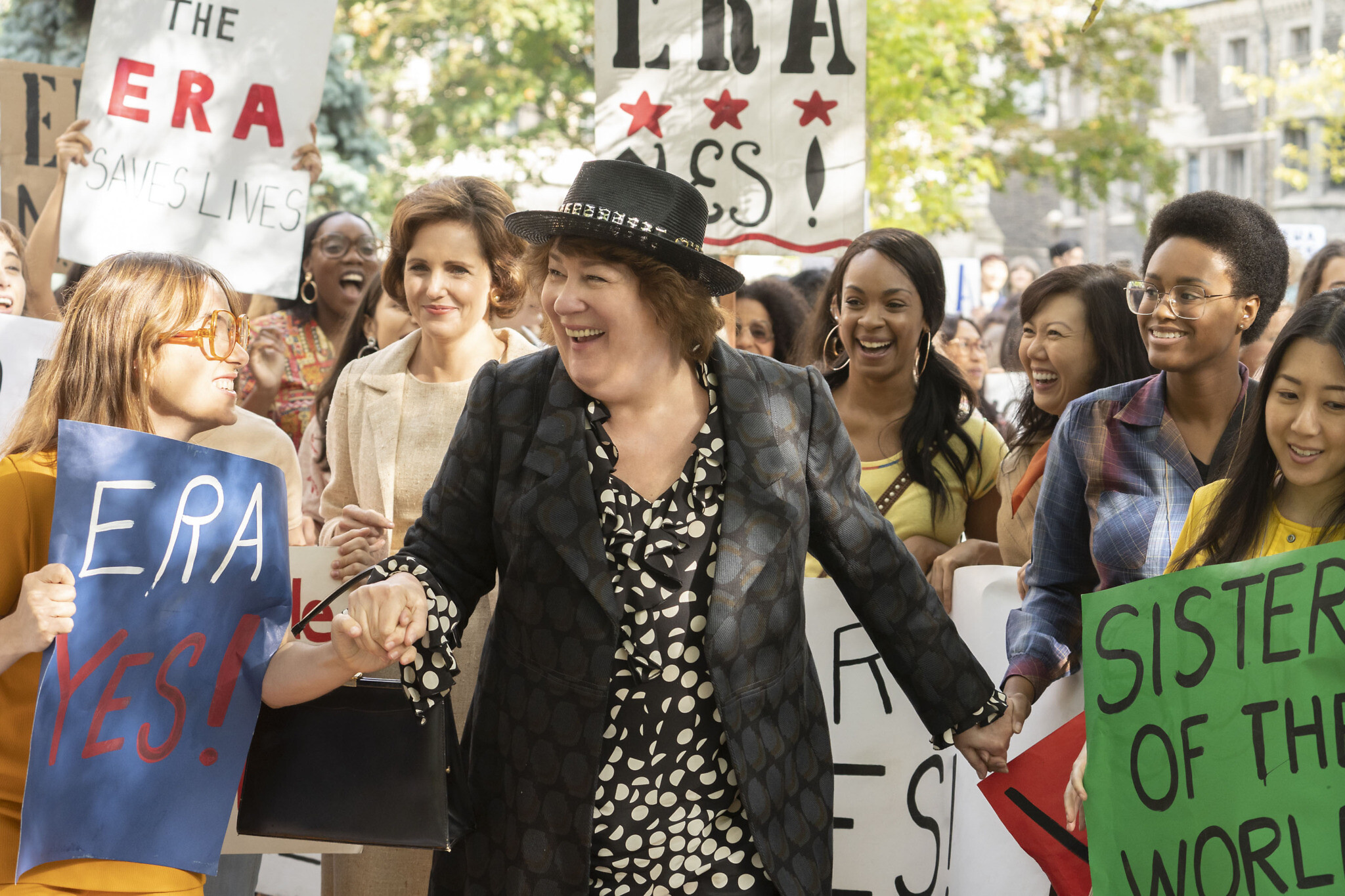Mrs America creator Dahvi Waller: ‘What woman would oppose women’s rights?’
Cate Blanchett, Rose Byrne and Tracey Ullman star in gripping BBC2 drama exploring the fight for the Equal Rights Amendment in the 1970s
As she began to delve into the fascinating world of female politics in the 1970s, TV writer Dahvi Waller assumed like many others that “all women wanted equality, all women wanted to stand together and fight oppression.”
There was in her mind, the power of sisterhood.
“But Phyllis Schlafly really flew in the face of that,” smiles Waller, recalling the moment she realised there was a tantalising political drama centred around the women who opposed equal rights, just waiting to be written.
Get The Jewish News Daily Edition by email and never miss our top stories Free Sign Up
The resulting script evolved into Mrs America, a nine-episode series now airing on BBC2, which explores the rollercoaster journey of second wave feminists attempting to change the US constitution through the Equal Rights Amendment (ERA) and outlaw discrimination against women.
Right at the forefront were a number of prominent Jewish feminists, including lawyer and politician Bella Abzug (Margo Martindale) and writer Betty Friedan (Tracey Ullman), as well as journalist Gloria Steinem (played by Rose Byrne), whose father was Jewish and Shirley Chisholm (Uzo Aduba), the first black woman elected to the Congress.
But despite their efforts, the ERA was never ratified and feminists are still waiting for that moment nearly 50 years on – largely in part to the opposition they faced from the most unlikely of places – other women.
At the helm was Schlafly (played superbly by Cate Blanchett), a deeply conservative activist who was anti-abortion, anti-feminist and hellbent on preserving the role of housewives across America.
Creator and showrunner Waller, who alongside Blanchett also served as executive producer on the series, says: “There is something intriguing about women opposing equal rights. What woman would do that?
“But you have to understand, Phyllis and her army of homemakers were actually a very powerful cover for the patriarchy and the misogynists who never wanted to ratify the ERA.
“In reality they weren’t opposing equal rights, they were opposing change. These are very conservative women who grew up at a time when being a homemaker, a wife and a mother was the most idealised version of womanhood.
“But by the 1970s, they feared their status would disappear. They had a tremendous amount of anxiety and Phyllis tapped into that.”
Before embarking on her latest project, Waller, who served as a writer and producer on the critically-acclaimed series, Mad Men, threw herself into researching around the subject to find out as much as possible about the key players and what made them tick.
“I have to be honest, I knew almost nothing about the ERA – in fact, I had to look up on Google to find out what it was”, she admits with a laugh.

But having sifted through hundreds of documents, “arguments for and against, all the passages I could get my hands on,” Waller not only developed a good knowledge of the historical background, but also an empathy with each of the women played out on screen – even Schlafly, who feminists derogatorily referred to as the “antichrist”.
Each episode follows events through the eyes of a different woman and reveals a little more about their particular stories.
For Waller, being able to focus on Friedan and Abzug in this way was particularly rewarding for her as a Jewish woman herself.
“I was just delighted to be able to have not just one, but two middle-aged Jewish heroes in the show,” she enthuses, before explaining how each woman’s Jewish identity features in the series and played a role in developing their own sense of feminism.
“There’s an episode where we show Betty going to high school and all her friends joined the sorority, but she was not allowed because she was Jewish – and they all dropped her. I think her experience of being ‘otherised’ definitely played into her feminist awakening.
“As for Bella, she started out as a crusading civil rights lawyer and definitely identified as Jewish. I imagine the concept of tikkun olam or fixing the world, did impact her sense of ideology.”

The series deftly captures the zeitgeist of the 1970s, from the zippy soundtrack featuring Walter Murphy’s A Fifth of Beethoven, to Steinem’s enviable aviator glasses and Abzug’s oversized hats – or as Waller describes it, “the really fun part of making this show.”
“Actually, we get to recreate two worlds in the 1970s. One is the feminist world of modernity, rock ‘n’ roll and disco, bright yellows and greens. Then there is the conservative world, which has a much more 50s feel to it and I really enjoyed figuring out how visually we could contrast those two worlds.”
Speaking of different worlds, I ask Waller what she feels are the greatest legacies left behind by Schlafly and the second wave feminists, that are still felt 50 years on?

“Phyllis and her anti-ERA campaign actually played a role in the culture wars of the 1970s and the movement of the Republican party in becoming the party of the far right, paving the way for Reagan and Trump.
“In terms of equality for women, what I have learned from doing this show is that change comes in cycles. Every time we take a big step forward, like in the Roaring Twenties, or the late ‘60s and 70’s, there’s always a backlash – and it’s one that can last 40 years.
“That feels where we are today, but much closer perhaps to change again.
‘In a way, I hope the series galvanises people to never be complacent and to keep fighting for your rights.”
Mrs America continues on Wednesdays, 9pm on BBC2 and is available to watch on BBC iPlayer

Thank you for helping to make Jewish News the leading source of news and opinion for the UK Jewish community. Today we're asking for your invaluable help to continue putting our community first in everything we do.
For as little as £5 a month you can help sustain the vital work we do in celebrating and standing up for Jewish life in Britain.
Jewish News holds our community together and keeps us connected. Like a synagogue, it’s where people turn to feel part of something bigger. It also proudly shows the rest of Britain the vibrancy and rich culture of modern Jewish life.
You can make a quick and easy one-off or monthly contribution of £5, £10, £20 or any other sum you’re comfortable with.
100% of your donation will help us continue celebrating our community, in all its dynamic diversity...
Engaging
Being a community platform means so much more than producing a newspaper and website. One of our proudest roles is media partnering with our invaluable charities to amplify the outstanding work they do to help us all.
Celebrating
There’s no shortage of oys in the world but Jewish News takes every opportunity to celebrate the joys too, through projects like Night of Heroes, 40 Under 40 and other compelling countdowns that make the community kvell with pride.
Pioneering
In the first collaboration between media outlets from different faiths, Jewish News worked with British Muslim TV and Church Times to produce a list of young activists leading the way on interfaith understanding.
Campaigning
Royal Mail issued a stamp honouring Holocaust hero Sir Nicholas Winton after a Jewish News campaign attracted more than 100,000 backers. Jewish Newsalso produces special editions of the paper highlighting pressing issues including mental health and Holocaust remembrance.
Easy access
In an age when news is readily accessible, Jewish News provides high-quality content free online and offline, removing any financial barriers to connecting people.
Voice of our community to wider society
The Jewish News team regularly appears on TV, radio and on the pages of the national press to comment on stories about the Jewish community. Easy access to the paper on the streets of London also means Jewish News provides an invaluable window into the community for the country at large.
We hope you agree all this is worth preserving.
-
By Brigit Grant
-
By Laurent Vaughan - Senior Associate (Bishop & Sewell Solicitors)
-
By Laurent Vaughan - Senior Associate (Bishop & Sewell Solicitors)
-
By Laurent Vaughan - Senior Associate (Bishop & Sewell Solicitors)
-
By Laurent Vaughan - Senior Associate (Bishop & Sewell Solicitors)





















